[ad_1]
Eric LeGrand has dreams that he’s walking. It’s been more than 13 years since he’s taken a step on his own, but in his dreams, there’s no wheelchair. He stands tall. His feet propel his 6-foot-2, 250-pound frame forward. His arms swing at his sides. Then, he says, the dream always presents a test. Sometimes, a staircase. Other times a football he wonders if he can throw, or a plate of food he must feed to himself. Sometimes, he has the urge to start running. But no matter the challenge, he never completes it. “I always remember a limitation,” he says. “And then it usually moves on to another part of the dream.”
LeGrand—at least in his subconscious—is the only one who’s allowed to say he can’t do something. On October 16, 2010, while a junior at Rutgers University, LeGrand fractured his C3 and C4 vertebrae when he laid a violent hit on a kick returner, leaving him paralyzed. Doctors said he’d be on a ventilator for the rest of his life. He’d never again eat solid foods, they said. He’d never walk again.
“Basically,” he says, “they told me I’d never live a normal life.”
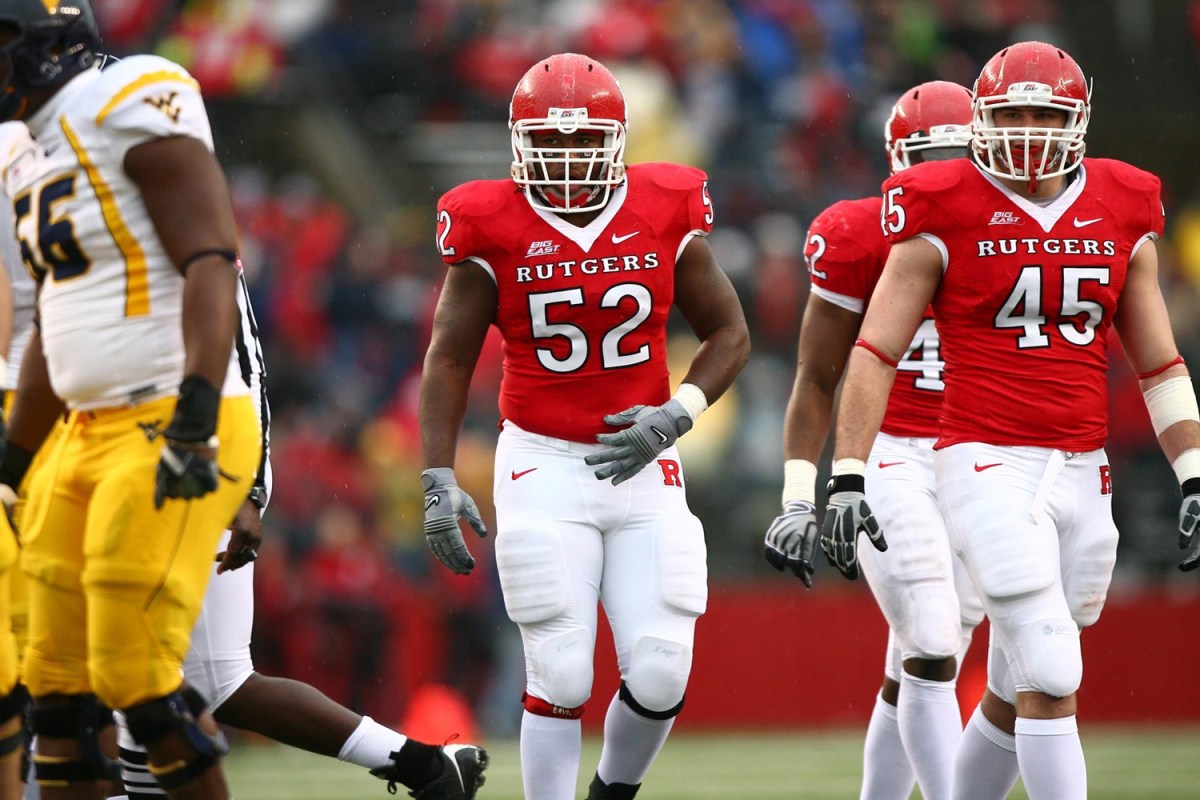
Eric LeGrand (center) on the field during a Rutgers Scarlet Knights vs. The West Virginia Mountaineers game in 2009. [Photo: courtesy of Eric LeGrand]
LeGrand began proving people wrong immediately. Five weeks after his injury, he was off the ventilator. Days later, he ate solid foods at Thanksgiving. As for the walking, 13 years in, he’s still working on that. “And I will walk again,” he says.
As for normal, he’s created a new one. One thing LeGrand says he’s lost is his spontaneity, as even the simplest tasks have become arduous. He walks in his dreams, but he wakes to the reality of his new morning routine. Between 7:30 and 8 a.m., a nurse and aide lift him out of bed and into his shower chair. They bathe him, empty his bowels, and lay him back on the bed to dress him. Then, they lift him into his wheelchair, and he begins his day. The whole process takes between 2.5 and 3 hours.
What follows, depending on the day, is physical rehabilitation and a smattering of entrepreneurial and philanthropic endeavors. LeGrand has rebuilt his life as a motivational speaker and author. In 2013, he founded Team LeGrand, a fundraising arm of the Christopher & Dana Reeve Foundation, which is dedicated to treating and working toward curing spinal cord injuries. He’s been a sports analyst for ESPN, Rutgers radio, and other networks. Most recently, he’s opened a coffee shop and launched a namesake whiskey label, LeGrand Whiskey.
When asked what gives him the confidence to venture into so many arenas previously uncharted to him, the answer left his lips before I finished the question. “Not having any fear,” he said, cutting me off. “People get so stuck in fear of failure, or of what people are going to think of them. I’m not afraid to fail because I know that I’m trying to make a difference. And I’ve worked my ass off, even with my situation. I physically can’t do things, but my brain is just as powerful as anybody else’s.”
Upon this ethos, LeGrand is crafting more than a new normal for himself.
He’s building an enterprise.
It’s Who You Are, and Who You Know
The first thing you notice when you meet Eric LeGrand isn’t his massive, seated frame. It’s not even his wheelchair. It’s his smile, candid and constant. And in his smile lies the key to his thriving in the wake of his injury. Sure, we’d all like to think we’d meet a seemingly insurmountable challenge like cancer, ALS, Alzheimer’s, or paralysis with grace and optimism.
The truth, though, for many of us, would likely differ.
His newfound celebrity helped. LeGrand’s impossibly positive attitude while facing paralysis earned him the Jimmy V Award for Perseverance at the 2012 ESPY Awards. Later that year, he was named the most influential person in New Jersey sports by The Star-Ledger. Subway brought him in as one of its athlete promoters alongside Michael Phelps, Apolo Ohno, and Justin Tuck. Rutgers retired his number 52 jersey. Along the way, his Rolodex swelled with celebrities and partners. He met Jay Z and Beyoncé at the Sports Illustrated party back in 2011. He spent time with The Rock at the premiere of his HBO series, Ballers. He’s been on set with Kevin Hart and Bryan Cranston and developed a web miniseries with director Peter Berg and others. The list goes on.
While he may not have directly parlayed every introduction into a business opportunity, being in that company has elevated his profile. And it’s allowed more people than he ever imagined to hear his story.
One of those people is Brian Axelrod. In 2013, he was working with Prove People Wrong, an apparel company founded by four undersized hockey players who were told they were too small to compete. Axelrod recognized LeGrand as “the ultimate Prove People Wrong story,” he says, and messaged him on Twitter, asking if he could send LeGrand some gear. That led to them creating custom apparel together, which spiraled into a friendship.
Axelrod’s background wasn’t in apparel, though. It was in spirits. After working with major suppliers like Bacardi and Jim Beam, in 2013, Axelrod transitioned into the celebrity space, helping Jay Z launch D’ussé Cognac and later partnering with Conor McGregor to create Proper No. Twelve Irish Whiskey.
Bacardi eventually purchased Jay Z’s stake in D’ussé for $750 million, while McGregor’s whiskey sold in 2021 to Proximo Spirits for $600 million. These were part of a run of absurd celebrity spirit payouts that included Ryan Reynolds’s Aviation Gin selling for $610 million and George Clooney and partners scoring $1 billion for Casamigos Tequila.
LeGrand, having developed the muscle for recognizing trends, saw an opportunity and called Axelrod. “I want to get into the spirits business,” he said.
“Yeah,” Axelrod responded. “You and everyone else.”
Starbucks, Dunkin’, LeGrand
For LeGrand’s first strictly entrepreneurial pursuit, long before he even considered the spirits game, we have to go back to 2020 and the COVID-19 pandemic.
LeGrand’s injury left his lungs weakened. Like any muscle, if unused, the lungs will deteriorate. Since he can’t run and jump and do cardio like most, instead, LeGrand does breathwork twice daily to maintain his lung capacity. His weakened lungs render him high-risk for respiratory illnesses. He’s endured multiple bouts with pneumonia, including one that nearly killed him in 2021. His lung collapsed. He was put on a ventilator and sedated for five days. He spent 16 days in the hospital recovering.
Because of the risk COVID posed, he, like many of us, spent months confined to his home; and like most, he got restless pretty quickly. “I got tired of watching Netflix,” he says. “I mean, how many shows can you really watch?” He ditched Netflix for audiobooks. He listened to David Goggins, 50 Cent, and Phil Knight, among others. He also spent more time on social media than he’s used to, which led to an observation.
“The world is at each other’s throats,” he remembers thinking. “Everyone hates each other. Everyone’s trying to find a way to tear people apart. So, I thought, people look to me as an inspiration, as motivation. I bring people together. So, what else brings people together, and how can I bring that to people on a daily basis?”
The answer, he decided, was coffee.
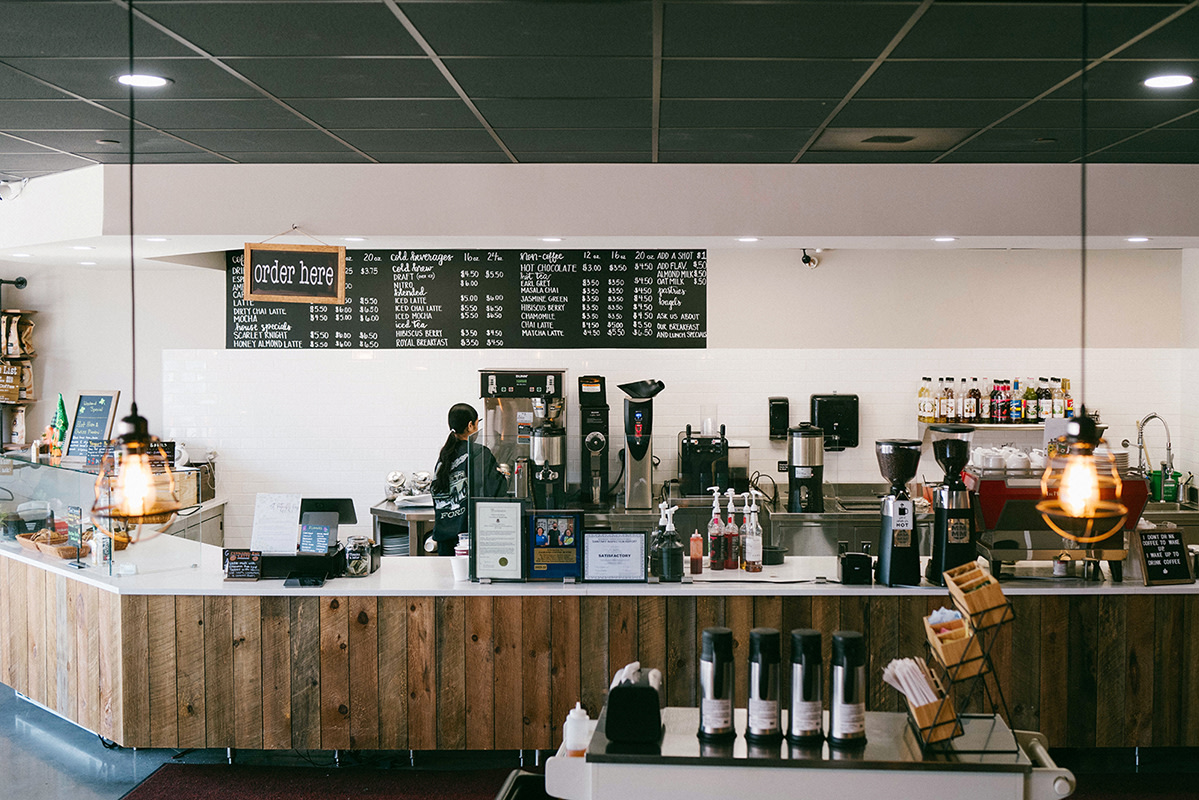
LeGrand Coffee House opened in May 2022 in Woodbridge, New Jersey. [Photo: Elianel Clinton for Fast Company]
He had identified a problem and what he thought was a solution, and it didn’t take him long to fill in the gaps. What and where were simple. New developments were popping up all over his hometown of Woodbridge, New Jersey. “But we really didn’t have a mom-and-pop coffee shop,” LeGrand said. “We had Starbucks and Dunkin’. So I decided I was going to take a leap of faith and open a coffee shop.” The when was equally simple—as soon as possible.
It was the how that he’d have to figure out.
Straight Into the Fire
There were a few hurdles. First, LeGrand had never had a cup of coffee. He’d also never run a true retail business. He’d never dealt with inventory and distribution and labor.
LeGrand first tried coffee in August 2020—a simple cup of black coffee. “And I’ll tell you what,” he said, “it changed my life. I said, ‘I am missing out on some good stuff.’ Ever since then, it’s been a journey.”
The next step in that journey was googling “coffee business advisor.” One of the top results was Bellissimo. The title tag read: We help you get your coffee shop open. He clicked the link, connected with his now-advisor, Matt Milletto, and began the coffee business startup course.
“I failed three times,” LeGrand says. “I didn’t know a thing about coffee.” He eventually passed, and a few months later, in January 2021, LeGrand Coffee House launched its online store. In May 2022, it opened its brick-and-mortar location in Woodbridge.
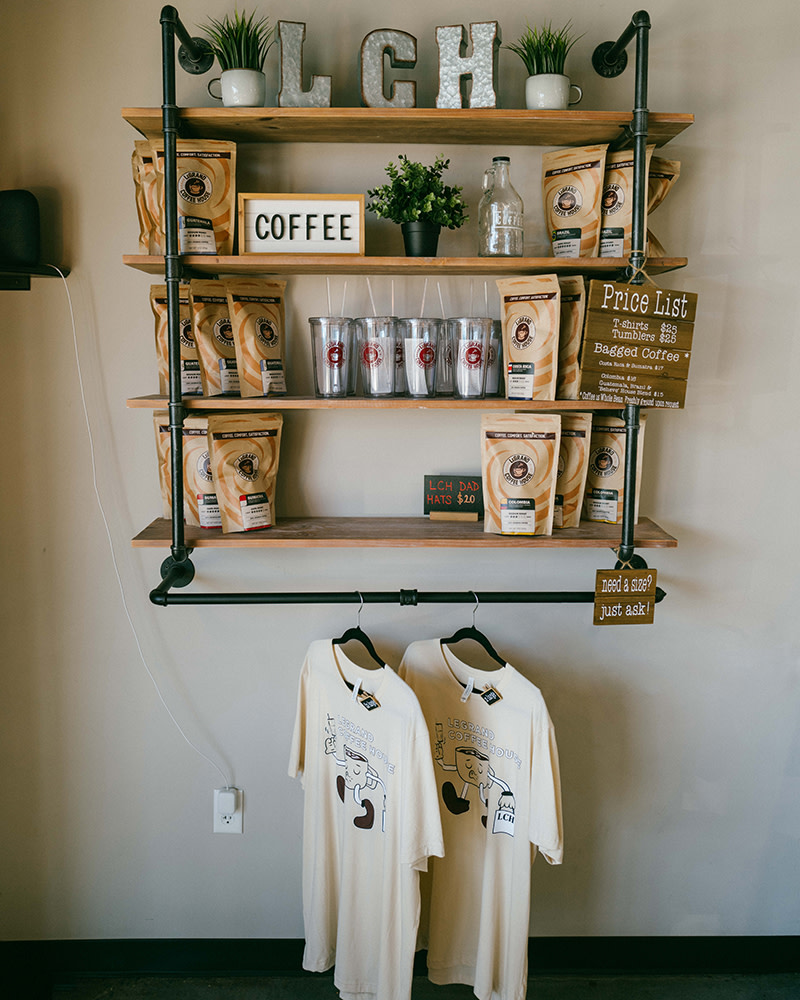
[Photo: Elianel Clinton for Fast Company]
LeGrand was involved in every step of the process, from building out the menu to operations to designing the shop itself. “We were very bootstrapped,” he says.
Mistakes were made. Being community-focused, he had developed a relationship with a small, local roaster who worked out of his garage. LeGrand hired him, ignoring his advisor’s counsel to go with an established roaster. The day the online store launched, 350 orders came in, and the roaster was inundated. He instantly fell three weeks behind on orders. The roaster told LeGrand he had to shut down the website. He was too overwhelmed. LeGrand wasn’t having it. “My hair was going gray,” he says. “Talk about sleepless nights! Oh my God, I really got to feel the stress of all those orders adding up and us not being able to fulfill them. It was just me being a beginner and not understanding the process and what it really takes to run a business.”
LeGrand and his team emailed each customer personally to explain. “Our customers were amazing,” he says. “They totally understood. They supported us and they stuck with us. I don’t think we had one complaint in that first three weeks, even though I was going crazy over here.”
LeGrand fired the local roaster and contracted a Brooklyn-based distributor that could handle the volume. But once the shop itself opened just over a year later, more problems arose. Friends and family had invested alongside LeGrand, but when his projection of roughly $300,000 in startup costs doubled to more than $600,000, funds got tight fast. They were overpaying for goods, undercharging at the counter, and overstaffing the shop. Some months, he dipped into his own pocket just to make payroll. “I got hooked up with a business advisor who came in and looked at my books, and he ripped me apart,” LeGrand says. “He told me, ‘You’re not going to survive this way.’”
Three years after launching the online store and nearly two years after opening the shop, the growing pains appear to be in the past. In its first year, the shop did $450,000 in sales. Now, in year two, it’s projected to increase sales by 33%.
“I didn’t go to business school,” LeGrand says. “I threw myself straight into the fire, and I’m learning all this on the fly. I listen to my coworkers and I listen to my employees, and now I’m happy with where we’re at. You can tell the business is growing.”
Coffee by Day, Whiskey by Night
With that kind of entrepreneurial stress, you can imagine why LeGrand would indulge in an occasional cocktail as a nightcap.
“Most people don’t even know I can drink,” LeGrand says. “They’re shocked when they see me drink. I get it, but it’s like, ‘Just because I have a spinal cord injury doesn’t mean I can’t have a drink.’”
LeGrand recalled the 2012 ESPYs. He was at the after-party with a couple of friends, when a pack of Gronkowski brothers, led by Rob, wandered over to them. While they were chatting, one of LeGrand’s friends returned with a tequila shot. “I threw it back,” LeGrand remembers, “and Gronk was like, ‘What?! You can drink?’ He started jumping around, like, ‘Let’s goooo!’ Next thing you know, I’m ripping shots of tequila with the Gronks.”
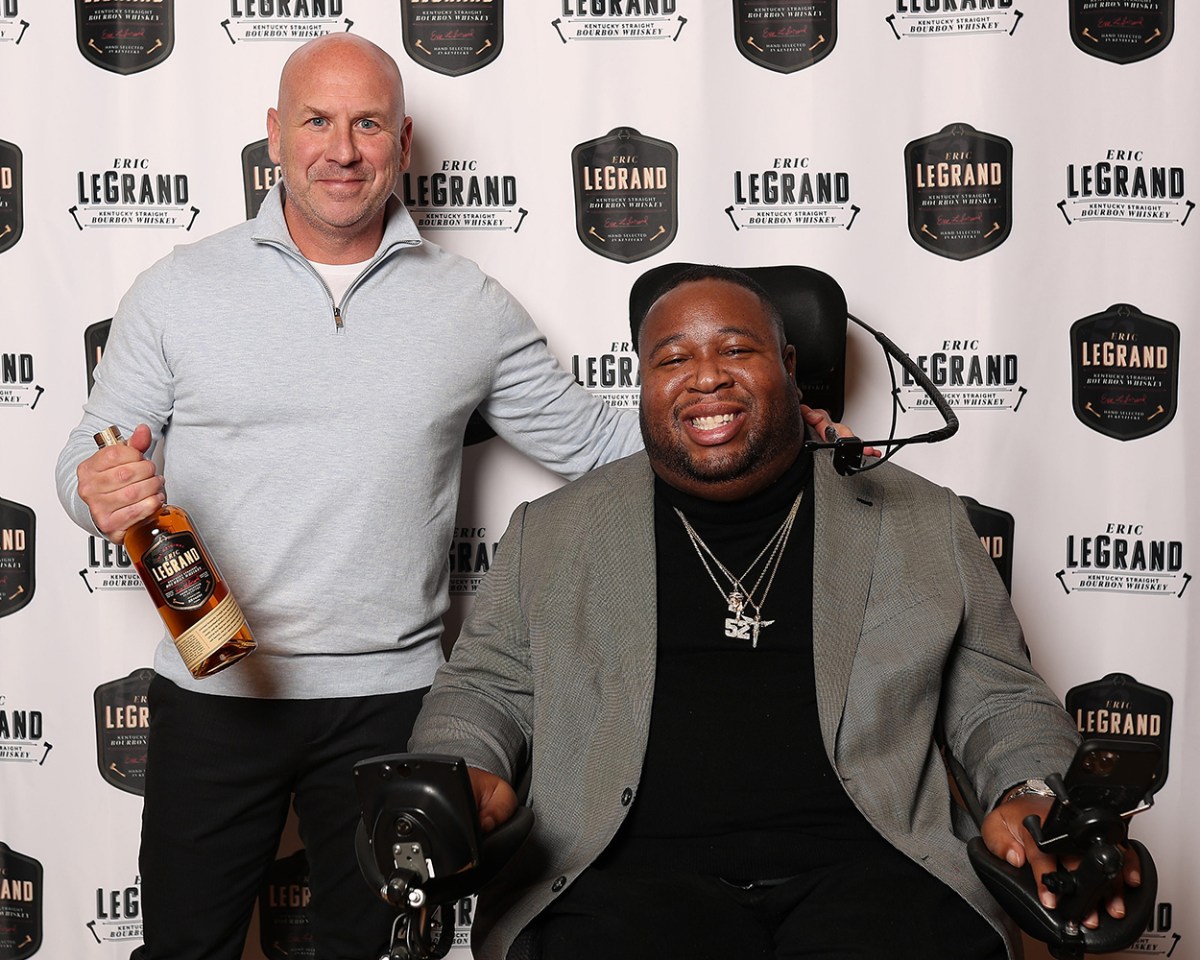
LeGrand with Brian Axelrod, his business partner and cofounder of LeGrand Whiskey [Photo: courtesy of Eric LeGrand]
It was 2021 when LeGrand approached Axelrod about getting into the spirits business. By then, they’d been friends for nearly a decade and had shared many drinks. Still, Axelrod said he’d have to sleep on it. “But only took me one night,” he said.
“Brian called me the next morning,” LeGrand recalls, “and he said, ‘E, I think we got something here.’”
You can put any celebrity name on a bottle, Axelrod reasoned. But everything LeGrand does has a purpose. It’s about sharing his story, inspiring people, and bringing people together. That, they decided, would be the foundation of the brand. So, at Axelrod’s urging, they decided to put LeGrand’s name on the bottle. “I want to tell his story through a bottle of whiskey,” Axelrod said. “Just like there’s Jim Beam, Elijah Craig, and Jack Daniel’s, I wanted to put Eric’s name on it so every time I go to a liquor store or a bar or a restaurant, I can use the bottle to tell his story. That’s the most important thing—to get his story out there so we can help not only him but also inspire people and help others who are fighting and dealing with paralysis.”
Bourbon is an aged spirit. To be called bourbon, the spirit must be made with 51% corn; aged in charred, new oak barrels; and made in the U.S. with no added flavors or colorings. There are various proofing rules, but perhaps the most important: The spirit must be aged a minimum of two years.
Good bourbon takes time. Great bourbon takes more time. This, LeGrand says, aligns with his story. Above all, he’s on a quest to walk again, and that’s not something that will happen overnight. It’s something that, like bourbon, will take time, patience, and dedication. “We could have done tequila, vodka, or gin,” he says. “But bourbon fits me.”
The Ultimate Hustle-and-Grind Team
For LeGrand, the most crucial step was finding the right bourbon. This is where Axelrod’s expertise came in. “We don’t want this to be a novelty where people come in and buy it just to support Eric,” he said. “We want this to be their go-to, everyday whiskey. Down the line, we’ll come out with higher marks, a rye, and different SKUs. But for the first one, we wanted it to be accessible and versatile where you can drink it on the rocks, you can drink it neat, or you can put it in a cocktail.”
Good bourbon is not easy to come by. Luckily, Axelrod knows some people in the industry. He tapped the Brindiamo Group, a brokerage that sources bulk liquor from some of the largest bourbon suppliers in the U.S.—including Kentucky, where 95% of all bourbon is made—to help find the right liquid for LeGrand Whiskey.
The bourbon boom has dominated the spirits industry for more than a decade, with sales surpassing 31 million cases in the U.S. in 2023, a 132% increase since 2003. With its rise in popularity, interest in the history and process behind bourbon is also at an all-time high, creating more educated and selective drinkers.
“The story around the brand has never been more important,” said James Hewlette, Brindiamo Group’s vice president of brand and distillery sales. “It’s not enough to just have a unique blend. It’s not enough to just have this age, from this distillery. The internet has totally changed the access that consumers have to information about your brand, and consumers have never been savvier.”
Once Hewlette heard LeGrand’s story, he was hooked.
“The ethos of the brand they wanted to create was kind of unique, and it piqued my interest from the get-go,” Hewlette said. “And then we had a follow-up call with Eric and I heard him tell his story, and that’s when it really hit. Every challenge he’s faced, he’s met. And his attitude toward life in general—it’s amazing. It’s infectious. And we were very interested in helping further his mission.”
Hewlette’s group eventually identified a two-and-a-half-year-old Kentucky straight bourbon out of Owensboro, Kentucky-based Green River Distillery, which is owned by the Bardstown Bourbon Company. Most whiskeys are bottled between 80 and 100 proof, or 40%–50% alcohol by volume. Green River sent a sample to LeGrand and Axelrod at 115 proof. They met up at the coffee shop for a tasting.
LeGrand remembers worrying that the proof was too high, that it would “taste like rubbing alcohol,” he said. “But I took a sip, and it went down so smooth that I just busted out laughing.”
Axelrod assured LeGrand that they would bring it down to 88 proof for bottling to make it more approachable, to which LeGrand responded, “If it tastes anything like the sample, we really got something here.”
LeGrand Whiskey celebrated its one-year anniversary earlier this month. It has sold more than 400 cases (2,400 bottles) in its online store; and today, between bars, restaurants, and liquor stores throughout New Jersey, LeGrand Whiskey is in more than 300 locations. With a focus on New Jersey in year one, LeGrand and Axelrod are working with national distributors to expand to multiple new states in 2024 and plan on opening a new round of fundraising in March that will be anchored by athlete investors, targeting between $1 and $2 million in capital.
“We got plans for Florida, Illinois, New York, and Massachusetts,” LeGrand says. “So we’re growing.”
“Right now, Eric and I are the only two people working on this brand,” Axelrod said. “We’re the ultimate hustle-and-grind team. But the best part, for me, is that I get to tell his story. I do staff trainings for some pretty big restaurant groups and liquor stores. And even if I don’t sell a single bottle of bourbon, the fact that I’m leaving those rooms knowing that more people know about Eric and his mission than when I walked in . . . that’s the real win.”
Living the Dream
LeGrand still gets goosebumps. He can’t feel them, but he can see them. Their job is to warm him up, but they usually don’t. Temperature regulation is one of his most persistent struggles. Because of his injury, his nervous system is “all jacked up,” he says. He’s not able to sweat. Most of the time, he’s freezing. He keeps his room at 80 degrees.
He rehabs daily. Since COVID, he’s done it at home instead of at a facility. Most days, he trains on an RTI bike, which is a training bike on which he’s mounted, then outfitted with electromagnetic pads that shock his leg, glute, and lower-back muscles into motion, forcing them to contract as if he were riding an actual bike.
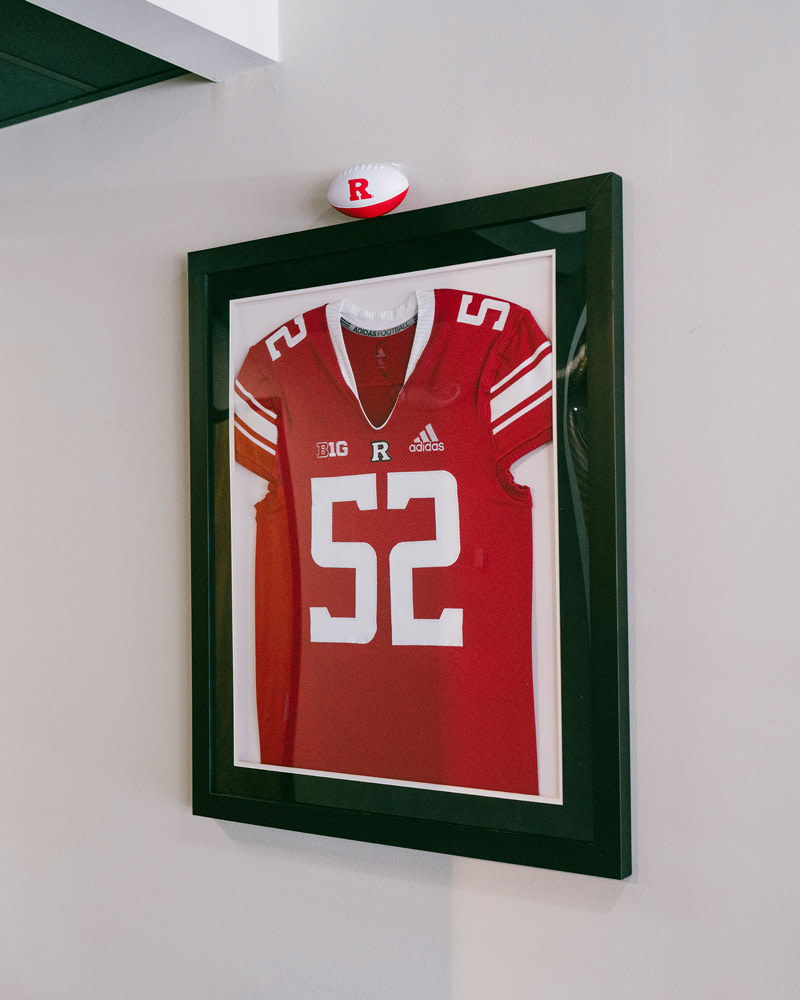
LeGrand’s jersey is displayed at LeGrand Coffee House. [Photo: Elianel Clinton for Fast Company]
“It’s good for me because it keeps the blood flowing, keeps the muscles contracted,” he says. “It keeps my bones strong and helps me stay in shape.”
The machine does all the work. But if LeGrand is ever going to walk again, the short-term battles are against muscle atrophy, which he combats by mimicking regular movements on the bike, treadmill, and standing frame to try and reestablish the connection between his brain and the rest of his body.
So whether it’s his morning routine, his rehab, or one of his many business ventures, LeGrand is always grinding. “Coffee by day, whiskey by night,” he says.
LeGrand’s support system is vast, and it begins with his mother, Karen LeGrand. It’s his mother who handles the bills. She chauffeurs LeGrand to and from events and meetings, makes sure he’s fed and comfortable at home, and even does all the banking for the coffee shop. She’s the accountant, the bookkeeper, the driver, and more—but always a mom first. “She used to call herself the Momager,” LeGrand says. “She does everything behind the scenes. And we argue about 37 times a day, but then we make up two minutes later.”
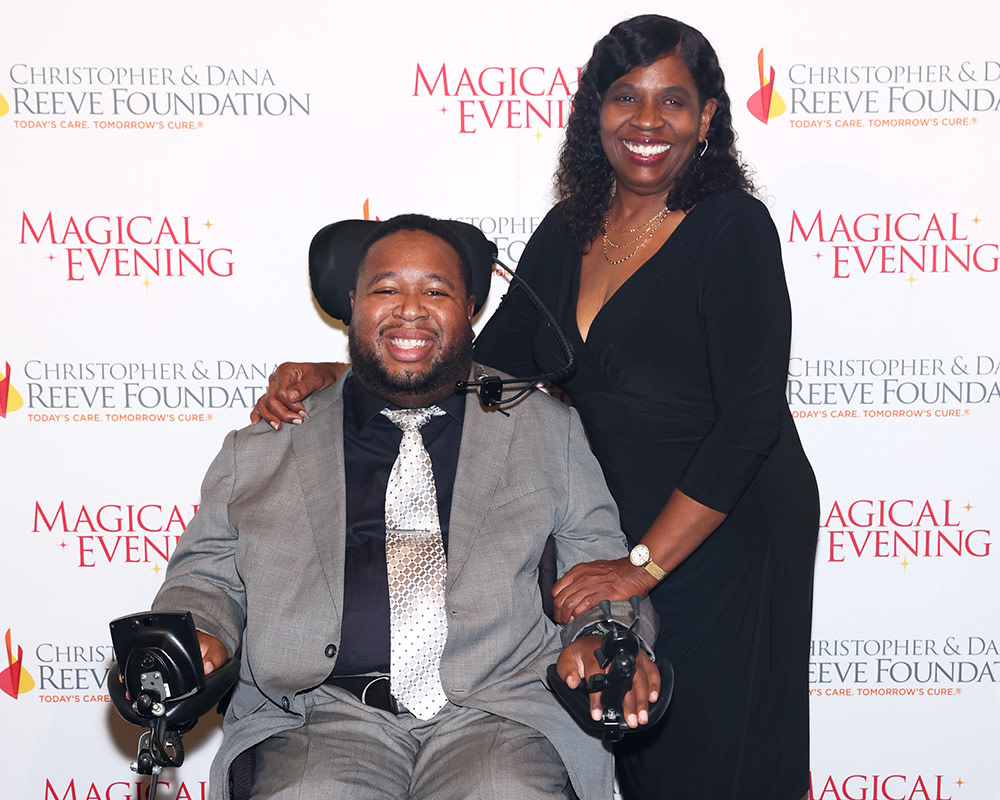
Eric LeGrand with his mother, Karen LeGrand [Photo: Monica Schipper/Getty Images for Christopher & Dana Reeve Foundation]
When his mother isn’t available, LeGrand calls on his lifelong friends. He has a group chat with 14 people in it. “Some of them I’ve known since I was five years old, some I met in middle school or high school,” he says. “I go through a rotation, and it’s amazing to see the amount of support from my friends. We’re all still living our lives; they’ve really stepped up to the plate and supported me and helped me along my journey.”
LeGrand supports himself and his family financially with income generated from speaking engagements and his occasional sports broadcasting. His care—from nurses to treatment and meds to rehab equipment—is paid for by insurance. Anything his basic insurance doesn’t cover is covered by the NCAA Catastrophic Injury Insurance, which is extended to all student-athletes.
So with his basic needs, however extensive, already met, LeGrand hasn’t taken any distributions to date from either the coffee house or the whiskey. Every dollar earned goes right back into the businesses. Currently, he and his coffee house team are working to build a franchise playbook, as franchising is the ultimate goal. Meanwhile, for each case of LeGrand Whiskey sold, $5.20 goes to the Reeve Foundation, an homage to the number 52 jersey LeGrand wore at Rutgers. Through Team LeGrand, which celebrated its 10th anniversary in September, he has raised more than $2 million for spinal cord research in partnership with the Reeve Foundation. And as he succeeds as an entrepreneur, he aims to give even more.
“The goal is to eventually exit LeGrand Whiskey and use the profits to write the Reeve Foundation the biggest check they’ve ever received,” LeGrand says. “I don’t know what the biggest check they’ve ever gotten is, but my goal is to be at the tippy-top of that.”
Maybe by that time, he can hand over the check in person, walking up to a podium, no matter the obstacle, without having to wake from the dream.
[ad_2]
#Paralyzed #football #field #Eric #LeGrand #entrepreneur


